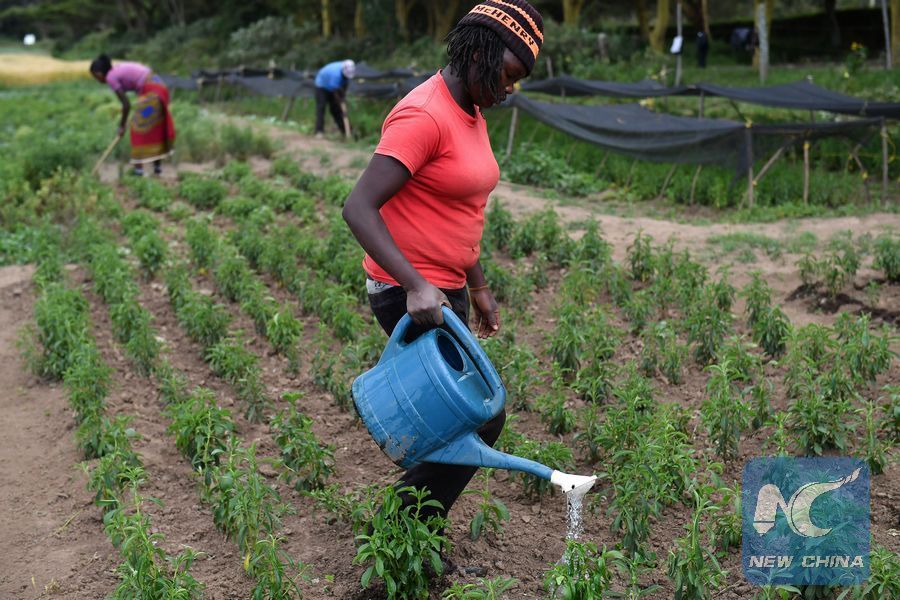
File photo shows local workers working at the experimental stevia field introduced by Chinese expert Liu Gaoqiong to Kenya at Egerton University in Nakuru, Kenya, Oct. 13, 2016. (Xinhua/Sun Ruibo)
NAIROBI, June 22 (Xinhua) -- Alan Jumba developed a passion for farming at a tender age, having grown up in a rural village in western Kenyan county of Vihiga, where households were guaranteed of food security and financial freedom through cultivation of staples like maize and legumes.
The 27-year-old agricultural extension officer is currently on the frontline to promote uptake of greenhouse farming technologies among small-holders in his locality thanks to training programs initiated by China's Nanjing Agricultural University in partnership with Egerton University located in Kenya's Nakuru County.
Jumba's day job involves assisting farmers to establish greenhouses using locally sourced materials to enable them to shield their crops from virulent pests, diseases and weather related shocks.
The training program at Egerton University has enabled him to transfer skills and knowledge required by local farmers to boost crop productivity amid challenges linked to erratic weather, pests and diseases, Jumba told Xinhua during a recent interview.
So far, small-holder farmers in Vihiga county and adjacent bread-baskets are responsive to Jumba's appeal for them to adopt technology-driven food production systems that promise higher returns.
Jumba is a beneficiary of a training program that has been run by Nanjing Agricultural University and the Confucius Institute in Egerton University since 2012 when the two institutions established a working partnership.
In October 2014, he participated in an agriculture technology course sponsored by the two institutions that injected fresh vitality in his quest to become a successful extension officer and trainer for small-holder farmers.
The course enhanced Jumba's ability to train farmers on how to construct and maintain greenhouses alongside management of lethal crops pests and diseases that undermined food security.
"I can seen a bright future in farming thanks to capacity building at the Confucius Institute in Egerton University," said Jumba.
Egerton University that hosts the first Confucius Institute with agricultural characteristics in Africa has been a hub for skills and technology transfer in modern farming methods.
Hundreds of Kenyan youth who have enrolled in this institution have benefited from a training in Chinese language and culture that also blends agricultural technologies.
Nearly 1,000 Kenyan youth have participated in 24 training courses in modern agriculture organized by the Confucius Institute at Egerton University while faculty members have also been sponsored to pursue post-graduate studies in China.
Liu Gaoqiong, an expert based at the Institute, is among the pioneer group of Chinese expatriates who have been promoting adoption of modern farming methods in Kenya for the last twenty years.
A former scholar at Nanjing Agricultural University, Liu is now contented while imparting knowledge and skills to farmers within Nakuru County to help transform their lives.
He was behind introduction of a novel concept of greenhouse farming that has enabled farmers in Nakuru to grow vegetables and fruits for domestic consumption and distant markets.
Liu has also set up two demonstration plots at Egerton University to expose Kenyan youth to breeding technologies that are required to revolutionize food production in the country.
Gilbert Mabuka, a 30-year-old high school graduate who studied agriculture as an optional subject was in 2015 trained on greenhouse farming by Liu and is in the frontline to redefine agri-business in his hometown.
The entrepreneurial youth currently grows 23 different varieties of vegetables both at the greenhouse and outside, thus sustaining his livelihood without disruptions.
Evans Kosgei, a 25-year-old student at Egerton University was in his element as he assessed the health of tomato and potato seedlings at the demonstration plot set up by Liu Gaogiong.
He told Xinhua that monitoring the health status of seedlings every morning has been a herculean task but vowed to soldier on since immense benefits were in the pipeline.
"It is a challenging job to monitor seedlings inside the greenhouse but skills acquired from the Chinese tutor have enabled me carry out the task with confidence," said Kosgei.
Over the years, Egerton University has become the embodiment of thriving Sino-Kenya cooperation in agriculture.
The Chinese government has funded the construction of China-Kenya Laboratory for Crop Molecular Biology, which was launched in October 2016 at the university campus to be one of the most advanced such labs in East Afrrica.
Sara Nyamoita, a horticulture major at Egerton University, said she had discovered a wild blueberry that she hoped to conduct experiment on its potential use at the lab.
"Advanced equipment from China has enhanced my ability to conduct experiments and research on the wild blueberry and its potential use in agriculture," Nyamoita told Xinhua.

